What it's really like when an animal saves your life—three women share their touching stories
Meet some very special animals who helped their owners in unimaginable ways
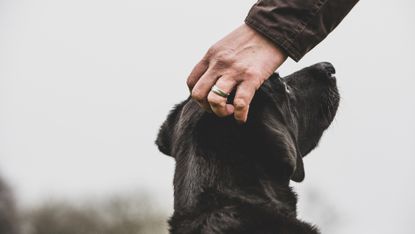

Animals really are our best friends—and in some cases, they can truly end up saving our lives. From rescue pets who helped bring new happiness following loss, to animals who helped their owners reassess their work-life balance, these stories will inspire and make you weep in equal measure.
We explore three incredible stories of animals who saved their lives of their owners in unique and amazing ways.
Hannah and Colin the pig
Colin the pig helped Hannah Clarke, 51, redress her work-life balance. Hannah is a director of Headsight Services, which offers animal-assisted therapy to children, young people, and adults. She lives in Winchcombe, Gloucestershire, with her husband Tony, 54, and a small menagerie of animals.
I’ve always loved animals and found animal-assisted therapy incredibly effective during my career as a psychotherapist. My dogs, cats, pygmy goats, geese, chicken, and guinea pigs have been instrumental in helping me help my patients.
I met Colin at a farm in Gloucestershire in 2018. At three months old, he snuggled onto my lap and my heart melted, so I bought him to be an addition to my animal therapy team. I thought he would be helpful, partly because we have so many negative phrases around pigs—ugly pig, fat pig, greedy pig. People who’ve been labeled like this can feel a connection to these misunderstood animals and it can help them re-evaluate how they perceive themselves.
I thought Colin was a micro pig but now, at 250kg, he has proved himself to be bigger and better than I ever could have imagined. Before all the lockdowns, I loved the way he’d interact with my patients. With a snort and a smile, rolling over for a belly scratch and giving his contented purr, he made the children I worked with feel seen, often for the first time in their lives. It always made me smile to watch the way Colin made my patients beam with confidence.
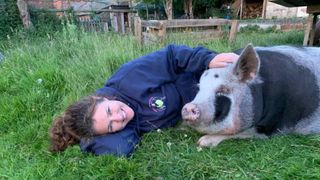
Hannah Clarke and her bestie, Colin the pig
Although I loved my job, my workload was exhausting. When I wasn’t working from home, I was driving all over the UK training therapists, teachers and foster carers. My husband Tony was worried I would burn out, but I was too busy to slow down.
Sign up for the woman&home newsletter
Sign up to our free daily email for the latest royal and entertainment news, interesting opinion, expert advice on styling and beauty trends, and no-nonsense guides to the health and wellness questions you want answered.
My body, however, had other ideas. In September 2019, I developed an excruciating pain in my neck that got progressively worse. I was diagnosed with a prolapsed disc and ordered to spend three months doing very little, to heal. An MRI confirmed the diagnosis. I had to stop driving, working at a computer or even sitting up for more than an hour at a time.
"Unwittingly, he helped me assess my work-life balance – I realized I needed to slow down"
During recovery, I spent a lot of time with Colin. I’d witnessed him work wonders with children in our therapy sessions, and now he was helping me. I’d sit on the hammock at the end of the garden and Colin would lie under my feet so I could rub his belly and sing to him.
Unwittingly, he helped me assess my work-life balance – I realized I needed to slow down, not just for three months but for good. When I returned to work I scaled back, then I offered the training program online during lockdown, which I will continue to do.
Every day, at around 4.30pm, Colin decides it’s time for me to finish work. He squeals outside the back door until I appear. He makes himself comfortable in his favorite spot, closes his eyes and waits for his lullaby. It’s flattering that Colin feels this is a ritual we can’t miss. He values our time together and I do too.
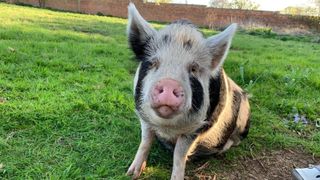
Who could resist a cuddle with Colin?
Throughout the pandemic, Colin taught me resilience in times of darkness. He doesn’t know about lockdown but throughout the cold weather, which he really dislikes, he kept on wading through the mud until it dried up and spring emerged, and I think that’s a great metaphor for our times.
He finds the utmost joy in the simplest things, be it a belly rub or a slice of watermelon. Every day, he teaches me how to just be calm and complete. I’m lucky to have a friend who insists I wind down every night – he’s my meditation and my wellness.
- Follow Colin’s adventures on Instagram @colinthepig
Amanda and Jasmine the horse
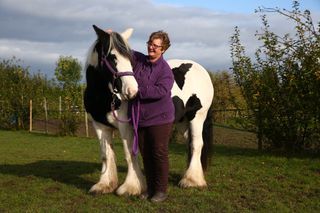
Amanda Gaughran and Jasmine, the Gypsy cob
Gypsy cob Jasmine helped Amanda Gaughran, 58, when she was struggling with grief. Amanda lives in Norfolk with her husband Ed, 60.
When the doctor told us nothing could be done to save our daughter Genna, it was she who comforted me. Then 23, Genna was fit and healthy until she started having seizures. She was diagnosed with a brain tumor and, after intensive treatment, we thought she’d beaten it.
In May 2012, a routine scan revealed the tumor had spread like a spider’s web. As the consultant explained Genna had six months to live, I cried and Genna wrapped her arms around me. I don’t know where she found her strength. In December that year, she passed away.
Although death released Genna from a painful journey, it left us empty. Everything stopped and life fell silent. Eighteen months later, Ed and our son, Phil, now 37, thought it might be good for me to rescue a horse—I used to ride competitively.
We saw the Blue Cross charity at the Burghley Horse Trials and they told us about a Gypsy cob called Jasmine, who they estimated was about six years old. They’d rescued her along with 70 other mistreated horses.
"'I believe Jasmine knew something awful had happened to us both"
When I met Jasmine, the abuse she’d suffered was evident. There was no light in her eyes and she seemed to be suffering from depression. I could see the sadness in her soul and wanted to give her the permanent, loving home she deserved.
Although she settled in well, she was nervous. I wondered what trauma she’d endured and promised her no one would ever hurt her, or even try to ride her, again. She would be my companion and I hoped she’d relax into her retirement.
As 2016 began, my life started to unravel. I had a bad back, was having problems at work, and I still hadn’t processed my grief. Sometimes I’d get to work, turn around and go home. In March 2016, I attempted to take my own life and ended up in a psychiatric hospital.
When I came home, I spent a lot of time at the stables. I finally allowed myself to grieve and, as I mucked out the horses or filled their food buckets, I’d burst into tears.
The other horses ignored me but Jasmine would look at me with her big, compassionate eyes as if to say everything was going to be all right. I’d bury my face into her mane as the tears flowed and she was so gentle and still, it felt like she was hugging me back. On my darkest days, she followed me around the yard, making sure I was OK.
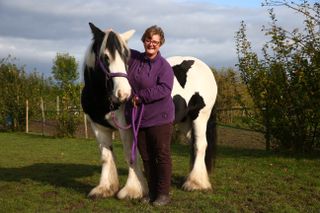
Amanda's rescue horse Jasmine saved her life
I believe Jasmine knew something awful had happened to us both and, although we could never tell each other our stories, she was my life saver. I knew I’d never attempt suicide again because Jasmine needed me.
As I started to heal, so did she. Gaining confidence, Jasmine became cheeky. She’d riffle through my pockets looking for treats and I’d have to feed her before the other horses or she’d have a tantrum.
When I was at my most broken, she never judged me. I was aware Ed and Phil were grieving too, so for their sake I hid how sad I was. With Jasmine, I didn’t have to pretend. She gave me a safe space to cry all my tears.
It’s been eight years since Genna died and we all still miss her like it was yesterday. If it wasn’t for Jasmine, I would still be lost and broken. But when I rescued Jasmine, she rescued me.
- To find out more about Blue Cross, to rehome an animal or make a donation, visit bluecross.org.uk
Amanda and Jupiter the dog
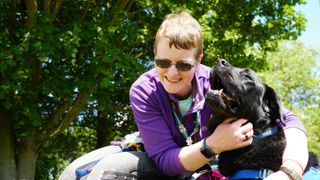
With labrador Jupiter by her side, Amanda Davidson has overcome her disability to take on charity runs and climb Mount Snowdon
Assistance dog Jupiter has given Amanda Davidson, 52, the confidence to overcome her disability. A serious incident investigator for the Ambulance Service, Amanda lives in Lincoln with her husband Mark, 49, and their children Tasha, 21, and Tyler, 18.
Throughout my career in the police force, trouble had a way of finding me. During one incident, I ended up scuffling with a man who resisted arrest. The injuries I sustained resulted in me having to retire from the force when I was 29.
My GP warned I’d have lifelong chronic back problems and he was right—the discs in my spine deteriorated. Then, when I was pregnant with Tasha, I developed the autoimmune disease lupus, which attacks tissues, joints and organs. My legs became so weak I couldn’t walk far before they collapsed.
Whenever I left the house I used a wheelchair. I felt like it made me invisible and that drained my confidence. Strangers spoke to my children above my head, not even making eye contact with me.
More from woman&home:
- How long should you walk a dog?
- The best family dog breeds to welcome into your home
- Are you mothering your pet? Here's what 'pet talk' really means
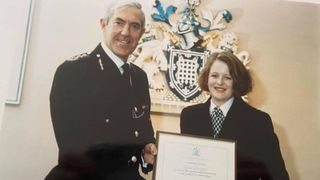
At 23, Amanda received a police bravery award
I wanted the kids to see me as a positive role model, so together we volunteered to do bucket collections for the charity Support Dogs. Often during our bucket collections there would be another volunteer with us who had a support dog, and so I had the opportunity to see for myself how the dynamic worked.
I decided I’d like a family dog but when we looked into rehoming a rescue dog, I was told a person in a wheelchair shouldn’t be a dog’s primary carer, as rescue dogs can have behavioural issues. That just spurred me to prove them wrong.
When Jupiter arrived as our family Labrador, I wanted to be the person to take him out for walks but I’d lost faith in my ability to do so. I pushed myself for his benefit, which in turn helped me. I then applied for him to be trained by Support Dogs.
Jupiter started training to be my assistance dog on his third birthday. He took to training flawlessly and learnt to help in ways I didn’t even realise I needed. I drop things and it can take great effort to retrieve each item. What is an insignificant movement for an able-bodied person exhausts me.
"Jupiter learned to help in ways I didn't know I needed"
When I was working in the office, Jupes would pick up what I dropped, push buttons and help me move from wheelchair to chairs. He does the same now I am working from home, plus he loads the washing machine. It is a relief to have someone by my side who so enthusiastically wants to make my life easier.
He also knows when I’m upset and tired. If I’m trying to walk and I’m in danger of falling over, he comes up behind me and alternates pushing each leg forward so I can get somewhere to sit down. He wasn’t trained to do that, he taught himself.

Support dog Jupiter has given Amanda independence
Seeing how capable and happy we are together, Mark and the children don’t need to worry about me – in fact, Tasha and Tyler have gone to university. So Jupiter hasn’t just given me independence, he’s given my children independence too.
He’s also given me the confidence to take part in 10k charity runs and climb Mount Snowdon. Four years ago, I took up archery, and in 2019 I obtained two UK records in my para classification and took silver at the National Disability Championships.
Thanks to Jupiter, I’ve done more as a person in a wheelchair than I ever did when I was able-bodied. Jupiter is not just my pet. He’s not just a member of my family. He has given me back my life and added to it.
- Support Dogs is a national UK charity that trains assistance dogs for children and adults.

Kim has been writing about the incredible lives and adventures of amazing women and brave children (and, occasionally, men too!) for nearly 20 years. A freelance writer who has written for all the best women’s magazines, Kim specialises in covering women’s health, fitness, travel, family, relationships and business themed stories. She counts herself very lucky to have written about so many interesting people over the years.
-
 Sienna Miller's tailored navy jumpsuit is the chicest alternative to sequins - and it has a hidden meaning
Sienna Miller's tailored navy jumpsuit is the chicest alternative to sequins - and it has a hidden meaningI never would have thought to add festive red accessories to a navy outfit, but Sienna proved me wrong
By Caroline Parr Published
-
 Is mulled wine good for you? 5 surprising effects of drinking the warming festive favourite
Is mulled wine good for you? 5 surprising effects of drinking the warming festive favouriteThis spiced Christmas drink is actually better for you than you might think - but can it still give you a hangover?
By Samantha Wood Published